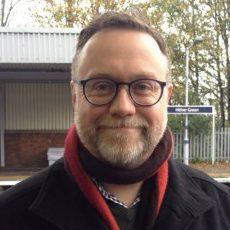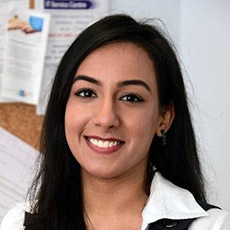YO Interview October 2021

Adam Bates
Consultant paediatric ophthalmologist and squint surgeon, UK

Ayesha Karimi
Ophthalmology registrar and UK national rep
Ayesha: Why paediatric ophthalmology?
Adam: I became interested in paediatric ophthalmology and strabismus in the 3rd year of ophthalmology training when I was first exposed to the sub-speciality. I particularly enjoyed understanding the processes and pathologies behind ocular movement abnormalities. I know that this can be daunting when you initially study this area going through training! There is a different range of vocabulary used in the field compared to general adult ophthalmology, which can make it unnerving, but I enjoyed working it all out. I also enjoyed working out how to get kids to co-operate with being examined; basically, it’s learning how to play with the younger ones which is fun when you get used to it.
Ayesha: Tell us about your career path so far.
Adam: I had my two pre-clinical undergraduate years at the University of Cambridge. I then did a year of Sociology and Politics, areas of life I have always been interested in [acquiring a degree that can be outside of Medicine between the pre-clinical and clinical years is the standard at Cambridge]. I moved to Manchester for my three clinical undergraduate years and one year of initial post-graduate ‘House Officer’ posts. Following this, I worked for a year spending half the week as a demonstrator in ocular anatomy for student orthoptists in Sheffield and half the week doing clinical duties, my first experience of ophthalmology!
I then started full-time ophthalmology training in Greater Manchester. The initial exposure to paediatric ophthalmology and strabismus was at the Manchester Royal Eye Hospital, a large tertiary centre, and this was followed by a 6-month attachment in Bolton, where my knowledge was consolidated. It was way too complicated initially! I got the opportunity to do many straight-forward primary convergent squint operations early-on in Manchester. Surgical lists were different then compared to now – most ophthalmologists usually had a squint case under a general anaesthetic at the end of the list during their regular theatre sessions doing cataracts, glaucoma or retinal surgery. I completed my first unsupervised squint case in my 4th year of training, after I had performed over 30 squint surgeries. I had great supervisors, Chris Lloyd who now works at Great Ormond Street Hospital, Alec Ansons at Manchester Royal Eye Hospital and Simon Wallace in Bolton. I had a varied and enriching experience with them.
For personal reasons, I decided to do an inter-deanery transfer to London during my 6th year of training. For my final 7th (sub-speciality) training year, I chose to do an attachment in paediatric ophthalmology and strabismus at Moorfields Eye Hospital, before further completing a post-final qualification year of Neuro-ophthalmology training at the National Hospital for Neurology and Neurosurgery at Queen Square. I then completed further paediatric ophthalmology training with Richard Gregson at Nottingham, before taking up a locum consultant position at Kingston-upon-Thames as a paediatric ophthalmologist. It was eye-opening working in this part of the UK, as the patient cohort was very different – the parents did a lot more background reading on their children’s presentations and were very knowledgeable before attending their consultations. This made it an interesting, albeit, a more challenging experience! I was offered a locum position at Maidstone and Tunbridge Wells NHS Trust, before acquiring a substantive post here.
Ayesha: You decided paediatric ophthalmology and strabismus was your subspeciality early through training, but what stage of your training are you expected to decide a subspeciality in the UK?
Adam: In the UK, it depends on what you want to do. Cornea and VR have been more competitive, so in general, the earlier the better. You may need to consider a higher degree; you may need to add publications to your CV early; you may need to be involved in long-term research projects. Opportunities in paediatric ophthalmology are more flexible, so you can decide to pursue this sub-speciality towards the end of training as things currently stand.
Ayesha: What would you say is/are your biggest achievement(s)?
Adam: I would say firstly, being involved in education. I was College Tutor 1 year after working at Maidstone Hospital. I then became Trainee Programme Director for the region 4 years later and finally 7 years after that, I became regional Head of School. I like to make sure that the quality of training is as good as possible and enjoy helping trainees (residents) progress and being an advocate for their needs. Ensuring stability of the system and maintaining a solid training rotation, as well as progressing and improving units can be very satisfying.
Secondly, maintaining good working relationships clinically. Not only with doctors, but orthoptists (who are a big part of your life), optometrists, nursing staff, healthcare assistants, etc. Bringing everyone together for the department to function well leads to a good deal of job satisfaction. It’s great to be involved in a system that works, where patients do not have to travel far for their appointments, where patients see the right person at the right time, be it an orthoptist and optometrist in their first appointment, a doctor in their second appointment, etc.
I’d also say I’ve found it rewarding to be able to ‘manage’ the team to a degree. We have different managers for the orthoptists, nurses, booking team, etc, but to be able to have the leadership qualities where people listen to you, without you being their direct manager, is a skill that can go a long way.
Ayesha: Tell us about your main audit / research project.
Adam: Being involved for over 14 years in a continuous prospective audit of adults’ and children’s horizontal squint surgeries is the most significant one for me. We set a target angle pre-operatively and measure deviance post-operatively from that angle, which is an objective and quantifiable method of measuring outcomes and an important part of UK practice. It’s very useful to be able to assess personal outcomes to see stability/improvement.
Ayesha: Tell us the 3 most challenging aspects of being in paediatric ophthalmology and squints.
Adam: Handling parents and keeping them on board can be challenging – sometimes parents have expectations that do not match what is achievable and realistic. Sometimes they may have a different view on what has caused their child’s condition. It is your job to explain it in a way that can make them understand and overcome preconceived ideas.
Breaking bad news is always difficult, especially when the child is likely to have a poor medical or ophthalmic prognosis. Sometimes, life-threatening diagnoses need to be given when the parents or child do not expect it. It is hard to break such news with adults and even harder with kids. Conversations telling parents that their child is not going to have a good level of vision or might lose their vision are sensitive and challenging.
To help with this, I would advise to offer a second opinion whenever appropriate. Parents and patients will read something in the news or hear something from a friend and may want to know more, in which case there is no harm in referring them to another centre. You are not doing this just for the parent/patient, but also for yourself.
Ayesha: What conferences would you recommend?
Adam: For anyone doing general ophthalmology or involved with on calls, departmental or regional teaching can be very useful to keep you updated. The American Academy of Ophthalmology and Royal College of Ophthalmologists’ Annual Congress are excellent. For paediatrics and strabismus, the British and Irish Paediatric Ophthalmology and Strabismus Association (BIPOSA) or American Association for Paediatric Ophthalmology and Strabismus (AAPOS) meetings are good on their own!
Ayesha: What are your plans for the future?
Adam: I’m happy where I am now, so would like to carry on with what I’m doing. Improvement of any department is a continuous process and there is always more to be done, so I plan on maintaining work on this, even with simple strategies like improving written patient information.
Ayesha: What entails a good fellowship?
Adam: Lots of clinical work and less administrative duties! And to be given as much autonomy as possible given your experience with some sessions that are only remotely supervised. For any surgical sub-speciality, there should be enough surgical lists. Personally, I think having more than one clinical supervisor per rotation is beneficial as you can get different opportunities and experiences with different consultants and get a grasp of variations in management. In my last years prior to being a Consultant, I had 4 supervisors in squint surgery: John Lee, Gill Adams, James Acheson and Richard Gregson. It really helped develop several ways of thinking about squint management and the range of experience makes you more well-rounded. It is also useful to learn how to do admin work to prepare you for a consultant post but not too much!
Ayesha: What is your typical week like?
Adam: I have 44 hours a week doing public (NHS) work. Any private work, which I don’t do, would be outside this. During my NHS hours, I have 2 children’s clinics and 2 adult clinics a week, children’s theatres once a week and one adult theatre once a fortnight. Around the time of the start of the pandemic, I chose not to continue doing cataract surgeries anymore and am mainly doing paediatric and adult squint operations. Also, included in the 44 hours, I work as an honorary consultant at King’s College Hospital in the neuro-ophthalmology clinic for 4 hours a week; 4 hours a week I am involved with Head of School / educational duties; and I am allocated 6 hours of research/admin/teaching and audit time a week.
For new consultants, I would advise that if your timetable is not ideal, there can often be opportunities to move sessions that come up with time. This might be if somebody leaves or wants to change their sessions also. As an example, if you have clinic in the morning and theatres in the afternoon, you may be rushing to finish the clinic in time and so avoid being late to theatres, in which case it is worthwhile asking if this could be switched around or you could have theatres on another day. Theatres are usually much more regulated in terms of finishing time in the UK, so it is worth considering this and negotiating a job plan that suits.
Ayesha: Any advice you could give to trainees? And those interested in paeds?
Adam:
- For paediatrics, spend time with the orthoptist and see how they deal with children.
- When deciding a speciality, pick one you a) enjoy b) will still enjoy in many years and c) will be good at. I enjoyed cornea as a subject but did not feel like I had the surgical skill set. It’s better to plan for the long term.
- Try and pick up the last set of notes from the clinic box in a shared clinic, eagerness is appreciated! Also, it’s good to read up on interesting cases you come across and mention it at the next session. Little things like that help set a good impression with your supervisor.
- It’s important to make a good impression as a junior consultant. This does not mean saying ‘yes’ to everything to make a good impression – get involved in some clinical governance or managerial roles, but it is entirely ok to limit what you can and cannot do, especially when you first start.
Ayesha: Thank you Mr Bates, this has been very informative!
